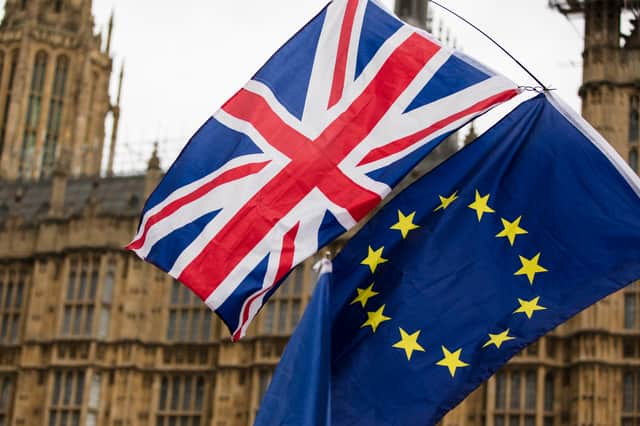10 things that will change in the UK on 1 January because of Brexit


As of 11pm on New Year’s Eve (31 Dec), the UK will leave the European Union (EU), cutting ties with the 27 nation bloc after 45 years.
The historic trade deal settled between Boris Johnson and the EU heads has clarified new rules of trading, helping businesses avoid import taxes and tariffs when the UK leaves.
Advertisement
Hide AdAdvertisement
Hide AdHowever, there will be changes regarding the rules on travel, commerce, living, working abroad, and security, on 1 January 2021.
Here are 10 things that will be different, effective immediately.
No more freedom of movement
After 11pm on 31 December, the free movement of people between the UK and EU countries will end.
Freedom of movement within the EU allowed workers to look for a job in another EU country, work there without needing a work permit, and reside there for that purpose.
The UK will now adopt a points based immigration system.
Advertisement
Hide AdAdvertisement
Hide AdDuty free shopping returns
From January 2021, UK passengers travelling to EU countries will be able to take advantage of duty-free shopping.
This means that passengers will be able to buy duty-free alcohol and tobacco products, where available, in UK ports, airports and international train stations.
People coming back to the UK from the EU are able to bring up to 42 litres of beer, 18 litres of wine, four litres of spirits and 200 cigarettes without paying tax.
Visa needed after 90 days
Travelling within the EU will change. Anyone from the UK wishing to stay in most areas of the EU for more than 90 days in any 180 day period will now need a visa.
Advertisement
Hide AdAdvertisement
Hide AdDifferent rules will apply to Bulgaria, Croatia, Cyprus and Romania. If you visit these countries, visits to other EU countries will not count towards the 90 day total.
Travel to Ireland will not change from 1 January 2021. You’ll also be able to work in Ireland in the same way as before.
Driving in EU countries
You may need extra documents when driving in EU countries from the UK from 1 January.
If you’re taking your own vehicle, you will need a green card and a GB sticker.
Advertisement
Hide AdAdvertisement
Hide AdYou might also need an international driving permit (IDP) to drive in some EU countries and Norway if you have:
- a paper driving licence
- a licence issued in Gibraltar, Guernsey, Jersey or the Isle of Man
Immigration now a points based system
Any EU citizen wishing to move to the UK (excluding those from the Irish Republic) will face the same points based system.
The system is the same as people from elsewhere in the world experience.
Under the points based system, anyone coming to the UK for work must meet a specific set of requirements for which they will score points. Visas are then awarded to those who gain enough points.
Advertisement
Hide AdAdvertisement
Hide AdLoss of instant access to EU-wide databases
The UK police force will also face changes from 1 January. They will lose instant access to EU-wide databases on criminal records, fingerprints and wanted persons.
Must renew passport six months early
From 1 January, to visit most countries in Europe you will need to renew your passport, if it has fewer than six months left before expiry, or if it is more than 10 years old.
The cost of renewal is between £75.50 and £85.
End of Erasmus programme
The UK will no longer take part in the Erasmus student exchange programme from next year.
Students currently looking to apply for the programme will no longer be able to, though students currently abroad on exchange will face no changes.
Advertisement
Hide AdAdvertisement
Hide AdThe Government announced it will be replacing the Erasmus programme with a new £100 million Turing scheme, to support 35,000 students to go on placement around the world.
No more EU ‘pet passports’
There will be no more EU ‘pet passports’ for dogs, cats and ferrets from 1 January.Travellers wishing to take their animal abroad will have to visit a vet 10 days to a month before travelling. The animal will need to be vaccinated or microchipped against rabies at least 21 days before travel.
A vet will need to issue a EU Model Health Certificate to allow the pet into the EU.
Pet owners will have to report with their animal to a Travellers’ Point of Entry once they arrive in Europe.
Advertisement
Hide AdAdvertisement
Hide AdGuaranteed free mobile data roaming due to end
Free mobile phone data roaming in the EU is due to end once the UK has left.
The UK-EU post-Brexit trade deal does contain measures to “to encourage cooperation on the promotion of fair and transparent rates for international mobile roaming” - but there is nothing to prevent mobile operators introducing new charges.
Travelling should check with their network provider for potential new roaming costs.